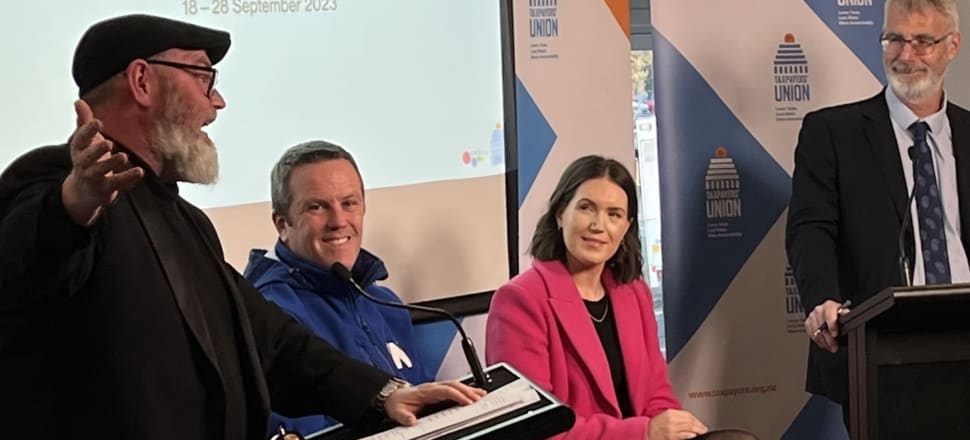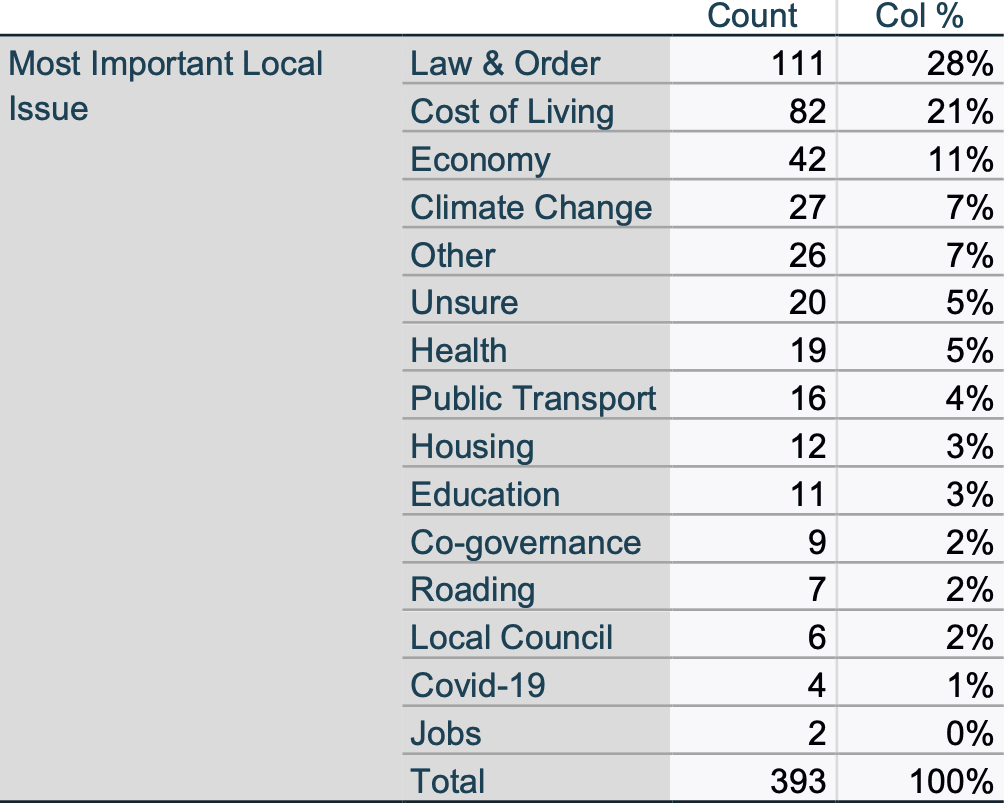
A knife-edge poll result in the previously rock-solid National seat of Tāmaki sets the scene for a debate with a distinct lack of camaraderie between the two allies of the right. Tim Murphy was in the room.
A pink wave came ashore at Mission Bay on Tuesday night, threatening to wash aside 63 years of National Party dominance in the Tāmaki electorate and revealing personal and political tensions between the centre-right's supporters.
A Taxpayers' Union-Curia poll of the seat taken last week shows the Act deputy leader and challenger Brooke van Velden's tide coming in at the right time, placing her on 38 percent of the decided vote to the 12-year National incumbent Simon O'Connor on 40 percent. With a margin of error of 4.9 percent, it is a statistical tie.
The gap mirrors a poll Act itself issued two months ago, one that seemed a triumph of hope over the experience of all those who have tried to dislodge National in Tāmaki since former Prime Minister Sir Robert Muldoon won it in 1960.

While a close polling result before an election can help rally an incumbent's support base, suddenly pricked by the real prospect of their person losing, it can also send a powerful message to undecideds that a "spill" is on and the second candidate can ride momentum through this period of advance voting.
The poll's release at the start of the Taxpayers' Union debate between O'Connor and van Velden sent a shockwave through a crowded function room on the waterfront – prompting some sharp exchanges between the candidates and evident irritation from both camps of supporters.
Act's challenge has the right on edge, and feelings raw. The common enemy, the Labour government, was something of an after-thought.
The poll showed 76 percent of the 400 surveyed Tāmaki voters say the country is going in the wrong direction. Crime is the highest concern, even ahead of the cost of living. O'Connor has spent the past year blasting Labour for a lack of action on ram raids and street crime, gangs and disorder. Act wants to lock 'em up, with a billion dollar investment in more prisons.
What is the most important local issue, which could affect your vote?

Adding to the feeling in the room generated by the poll and the indignation of some in National at Act choosing to work against O'Connor was a cacophony of roaring motorbike noise outside on Tāmaki Drive just after the debate addressed law and order.
"The Mongrel Mob" quipped co-host Damien Grant. "That's Winston arriving" chipped in his colleague Bomber Bradbury. Turned out it was neither a gang convention nor a gang of dirt bike riders, but 85 or so motorcyclists holding some kind of meet, machines lined up along the footpath as riders gathered or went for burgers or dumplings.
Inside, O'Connor opened hostilities, pointedly telling van Velden her talk of Act working closely with National in a government rang hollow in Tāmaki. To her claim she wanted to work with the blue side in a "tight, stable coalition," he interjected: "You're working really 'tight' with the National-Act thing tonight."
When the discussion turned to how Act and National would achieve their goals of cutting the public service and spending, van Velden hit back, telling O'Connor: "You want to keep 98 percent of Labour's spending."
The MP said while Labour spent recklessly "just wanting to throw the money about", on the other side of National, Act with its blunt target of cutting 15 percent of public service roles "just wants to cut, cut, cut", without care for the jobs of people involved.
National's approach of setting public sector chief executives a target of reducing spending by 6.5 percent would allow the departments to consider programmes as well as just people cuts. "This obsession to find 15,000 jobs is not the way forward. It could be, but we want to just say to chief executives 'look at your programmes and your people'. But just cutting jobs is not the answer."
Pressed on whether National would need to increase that target if it discovered in government that the Crown's books were in worse shape than expected, O'Connor gave a surprising answer. After noting National would exempt the health, education and defence votes, he said of the 6.5 percent figure: "You can change that if required."
An Act supporter in the crowd called out: "Make it 30 percent."
He repeatedly said National was the moderate voice, Act by implication heartless, to cheers from a voluble National contingent in the room. "People are important. I don't care if they are in the private sector, public sector or MPs themselves."
That last phrase, in light of the poll result, carried its own feeling.
Van Velden made no apologies for those 15,000 jobs that could go. She argued individuals and families had been required to cut spending to cope with the cost of living crisis and the government should do likewise and make the public service more productive.
When Grant asked her if Act would consider public asset sales, van Velden indicated her party would look at selling up to 49 percent of entities.
He told her there was little left to sell, "everything's been sold off". But van Velden shot back: "That's not true. We've still got Post."
On a more local issue, van Velden said she and Act had stood aside from the urban housing intensification law agreed by Labour and National. "The policy for free, three-storey houses is madness. It's going to lead to chaos."
O'Connor said he'd spent 18 months quietly and gently lobbying against the law National had signed up to and the party had now stepped back from the worst aspects of it.
There was not much else of local import other than both candidates backing the removal of the Auckland regional fuel tax, but nothing much on the candidates' personal character. No mention of views on moral issues – O'Connor's stance on abortion, for example, or van Velden's ushering through the House the euthanasia legislation.
One question asked O'Connor, a former candidate for the Catholic priesthood, for his favourite philosopher, and one he mentioned was the US thinker John Rawls. He summarised his view as: "Each of us steps back and tries to stand in the shoes of others. That's why I spend my life in trying to look out for others."
Van Velden, a former economics student, was asked for her favoured economist and surprised no one by nominating Milton Friedman. "There's no such thing as a free lunch."
The candidates were quizzed on trade and relations with China, Act's plan to remove the January 2 statutory holiday, ("Get rid of Matariki," was one call from the crowd, a little close to home for some in National who quietened that line), foreign investment, tax and climate change.
When O'Connor praised National as "moderate", he received both jeers from the Act corner and cheers from his own.
O'Connor concluded by urging people to "get rid of the litany of woe" caused by Labour, but to value "experience".
"You need a National MP in a National government."
Van Velden's message, to boos and heckling from the blue corner, was: "You can have a change of government and a change locally. There's no harm in having a little bit more pink, too."







